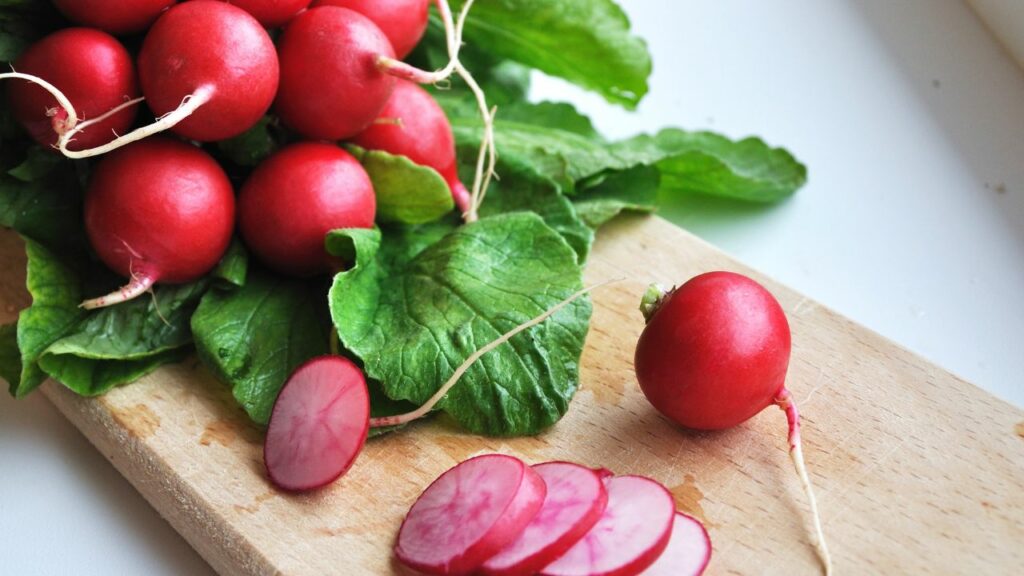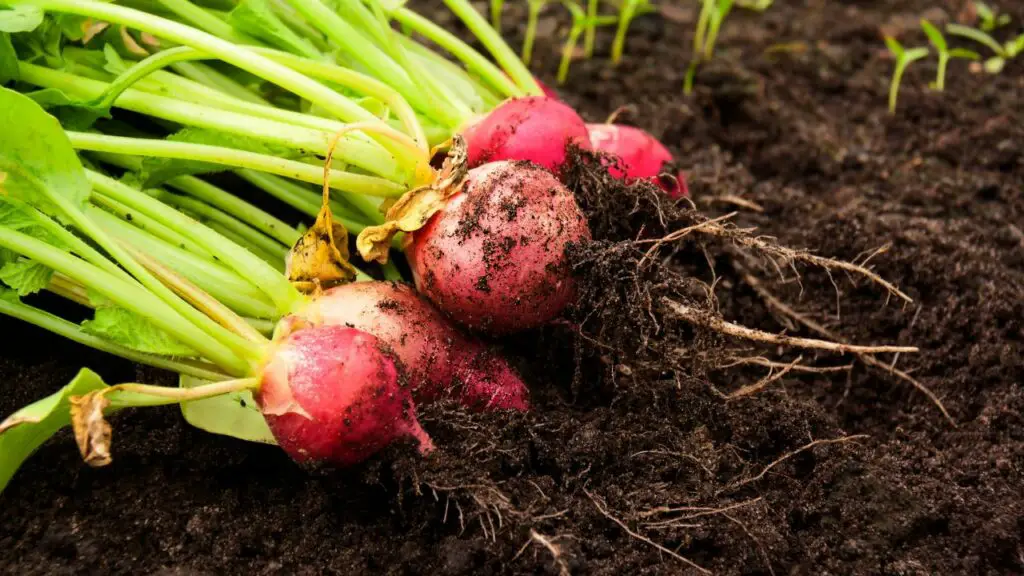Are you wondering if your furry friend can munch on some radishes? Well, you’re in luck because I’m here to spill the beans on this crunchy and nutritious vegetable.
Bunnies can safely eat radishes, including the leaves and stems. However, feed them in moderation and thoroughly wash them before feeding.
So, let’s dive into the world of radishes and learn how to use them as tasty treats!
Can Bunnies Eat Radishes?
The answer to whether bunnies can eat radishes is yes. Still, consider a few things before adding radishes to your bunny’s diet.
Radishes contain high amounts of fiber, which can help promote healthy digestion in rabbits. Additionally, radishes are a good source of vitamin C, which helps boost your bunny’s immune system.
However, as with any new food, introduce radishes to your bunny’s diet gradually and in small amounts. This allows your bunny’s digestive system to adjust to the new food and reduces the risk of digestive issues such as diarrhea or bloating.
It’s also essential to be mindful of the quantity of radishes you feed your bunny. While radishes are safe for bunnies to eat, feeding too many can lead to digestive problems. It’s best to feed your bunny radishes as an occasional treat rather than as a staple in their diet.
Lastly, ensuring that the radishes you feed your bunny are clean and free of pesticides or other harmful chemicals is crucial. Wash the radishes thoroughly before serving them to your furry friend.
Can Rabbits Eat Radish Leaves & Stems?

Rabbits can safely enjoy radish leaves and stems as they are a great source of essential vitamins and minerals such as C, K, and calcium. These nutrients help support your bunny’s immune system, blood clotting, and bone health.
However, be mindful of how many radish leaves and stems you feed your rabbit. Excessive consumption can lead to digestive problems such as diarrhea and bloating.
Generally, it’s best to introduce new foods gradually and in small amounts. To monitor your bunny’s reaction, offer a few leaves or stems at a time.
Another important consideration is the source of the radish leaves and stems. If you plan to feed your bunny from your garden, ensure the radishes are grown without pesticides or chemicals. Otherwise, thoroughly wash the leaves and stems before serving them to your bunny.
Do Rabbits Eat Radishes Straight From The Garden?
Rabbits have a natural affinity for fresh vegetables, which may lead them to nibble on radishes straight from your garden. However, exercise caution before allowing your bunny to enjoy this garden delight.
Radishes grown in gardens may contain pesticides or fertilizers that can harm your bunny’s health.
To ensure that the radishes you feed your bunny are safe to eat, washing them thoroughly before serving is crucial. This removes any harmful chemicals or contaminants that may have accumulated on the surface of the radishes.
It’s also important to remember that not all parts of the radish are safe for your bunny to eat. The leaves and stems are safe and nutritious, but the root can cause digestive issues if fed excessively. As with any new food, it’s essential to introduce radishes gradually and in small amounts.
How Many Radishes Can You Give Your Bunny?

Overfeeding your bunny with radishes can lead to digestive issues such as diarrhea and gas.
As a general guideline, offering radishes as an occasional treat rather than a staple in your bunny’s diet is best.
One or two radishes per week is safe for your bunny to consume. However, introduce new foods gradually and monitor your bunny’s response to ensure they don’t have any adverse reactions.
Radish Alternatives You Can Feed Your Bunny
If your bunny doesn’t seem to enjoy radishes or you want to add some variety to their diet, there are plenty of safe and nutritious vegetable alternatives. These vegetables offer a range of essential vitamins and minerals to support your bunny’s health and well-being. Some examples of rabbit-friendly vegetables include:
- Carrots: Rich in vitamin A and fiber, carrots are a great addition to your bunny’s diet. They are also a popular treat among bunnies due to their sweet taste.
- Broccoli: This cruciferous vegetable is high in fiber, vitamin C, and vitamin K, making it a great addition to your bunny’s diet. Be sure to introduce broccoli gradually to avoid any digestive issues.
- Kale: Kale is a leafy green vegetable high in calcium, vitamin A, and vitamin C. It’s a great way to support your bunny’s bone and immune health.
- Spinach: This leafy green vegetable is high in iron, fiber, and vitamin C. It’s a nutritious addition to your bunny’s diet. Still, it should be fed moderately due to its high oxalic acid content.
- Cucumber: Cucumbers are a low-calorie and hydrating vegetable that can be a refreshing addition to your bunny’s diet. They are also high in vitamin C.
- Celery: Celery is a crunchy and fiber-rich vegetable that is safe for bunnies to eat. It’s also a natural source of vitamin A, vitamin C, and potassium.
- Bell peppers: Bell peppers are colorful and flavorful vegetables high in vitamin C and fiber. They come in various colors and can add variety to your bunny’s diet.
Summary
Incorporating radishes and other safe veggies into your bunny’s diet can give them essential nutrients and keep them healthy and happy. Remember to introduce new foods gradually and feed in moderation to avoid digestive issues. With these tips and a range of veggie alternatives, your bunny will surely have a balanced and delicious diet!





